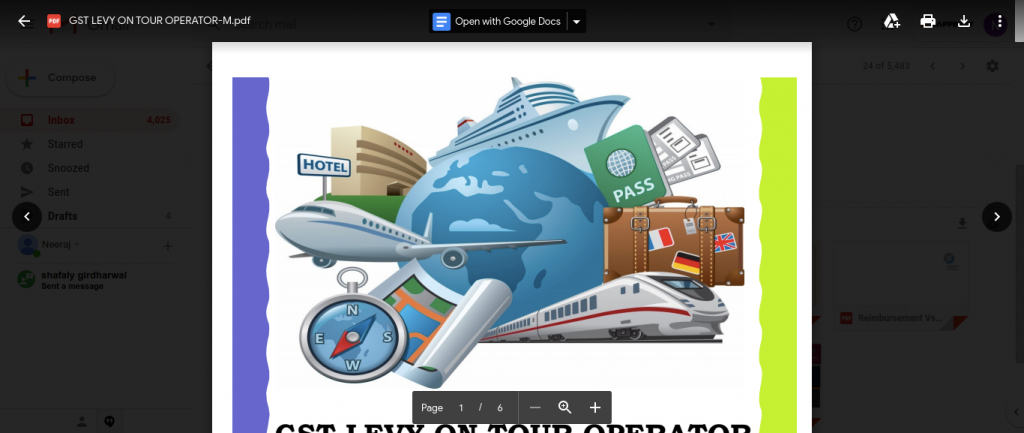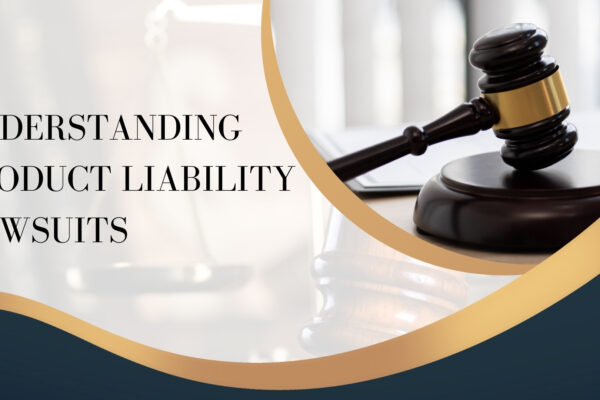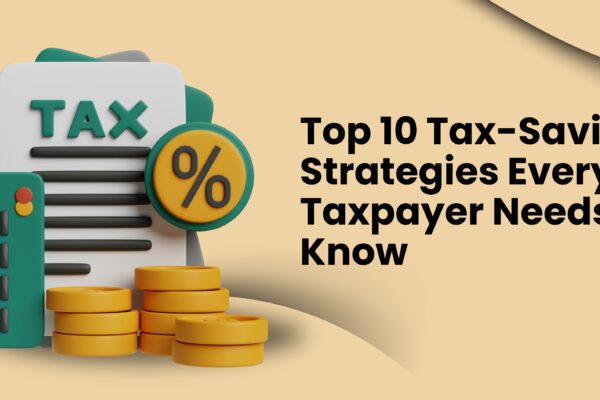GST LEVY ON TOUR OPERATOR
Who is a Tour Operator? Is there any definition made available under the GST Act?
Yes. The Notification No:11/2017 – CT – Rate – Dt: 28.06.2017 defines ” Tour Operator “as follows:
Any person engaged in the business of operating tours like planning,scheduling, organizing, arranging tours by any mode of transport.
It may include an arrangement for accommodation, sightseeing or anothersimilar service.Does Levy of GST Rate change from one Tour Operator to other operator? Yes. The classification depends upon the nature of the activity or transactions between the service provider and the service recipient. There are two types of ” Tour operators”
1. Acting as a Pure Agent
2. Tour operator service provider
1. Acting as a Pure Agent
Who is a pure agent? Is there any definition made available in the GST Act?
Yes. Explanation to Section 33 of CGST Rules prescribes all the following conditions to be satisfied to be a Pure agent.
1. A person who enters into a contractual agreement with the recipient of supply to incur his expenditure or cost in the course of supply of goods or services or both ;
2. He neither intends to hold nor holds any title to the goods or services or both so procured or supplied of the recipient of the supply ;
3. He does not use such goods or services so procured for his own interest; and
4. He is entitled to receive only the actual amount incurred by him and in addition for the supply provided by him on his own account.
On what value GST is applicable for a Pure Agent?
The value of the supply of services in case of pure agent has been defined in Section 33 of CGST Rules. The expenditure or costs incurred by a supplier as a pure agent of the recipient of the supply shall be excluded from the total value of supply if all the following conditions are satisfied:
1. He makes the payment to the third party on the authorization of such recipient.
2. Such payment made by the pure agent has been separately indicated in his invoice as reimbursement.
3. The supplies procured by the pure agent from third parties are in addition to the services he supplies on his own account.
In short, The reimbursement of expenses does not form part of the value of the supply of services by a pure agent.
Example: Mr.Ram a Customs clearinghouse Agent (CHA) is engaged to handle the import of goods from outside India on behalf of Mr.Raheem. Other than his service fee of Rs.10,000/-, Mr.Ram also recovers Rs.50,000/- from Mr.Raheem, Custom duty paid to the Customs Department. Here Mr.Ram is merely acting as a pure agent in the payment of Customs duty. Therefore the value of reimbursement of Rs.50,000/- does not form part of the value of supply from Mr.Ram to
Mr.Raheem. Hence, the value of supply is Rs.10,000/- and not Rs.60,000/-
What rate is applicable for Pure Agent?
GST Rate is 18% with Input Tax Credit ( CGST 9% and SGST 9% or IGST 18%). The GST will be levied on the value of service (excluding reimbursement of expenses). In our example, the GST will be levied on the value of Rs.10,000/- and not the entire value of Rs.60,000/-. there any restriction in availing Input Tax Credit? No. A pure agent can avail all eligible input tax credit (both inputs and services).
2. Tour Operator service provider:
How does he differs from a Pure Agent?
A pure agent only facilitates the transaction and helps the travellers to identify various supplier as per their requirements. Whereas, the tour operator does the entire booking of tours and the total fees charged shall include his margin. Hence he becomes a tour operator service provider and the entire service value is leviable under GST.
What rate is applicable for Tour Operator?
GST Rate is 5% with a restriction on availing of Input services (CGST @2.5% and SGST @ 2.5% or IGST @5%].
Is there any condition to be fulfilled by the Tour operator?
Yes. The tour operator has to fulfill all the following condition to avail composite GST Rate @ 5%.
The bill issued for the supply of this service indicates that it is inclusive of charges of accommodation and transportation required for such tour and
the amount charged in the bill is the gross amount charged for such a tour. Is there any restriction in availing Input Tax Credit?
Yes. The input tax credit of both goods and services not available. However, the ITC of input service is available in the same line of business. (Eg: a tour operator service procured from another tour operator service).
Whether the service provider collects CGST & SGST or IGST?
Yes. It may vary depending on the place of supply.
Related Topic:
GST: Guide on Reimbursement and Disbursement of Expenses
What is meant by Place of supply?
GST is a destination based tax. The goods or services or both will be taxed at the place where they are consumed and not at the origin. Place of supply under GST Act helps to define whether the transaction is intra-state or inter-state [CGST & SGST or IGST.]
When the registered dealer charges CGST & SGST or IGST?
The registered dealer will levy CGST and SGST on the supply of services made within the state ( Intrastate) otherwise IGST is leviable ( Interstate and Export)
How can place of supply be identified? Are any provisions available under the GST Act?
Yes. Place of supply of services has been defined under section 12 and 13 of IGST Act. Section 12 explains the place of supply of services where both the location of the service provider and service recipient is in India. Section 13 explains the place of supply of services where the location of the supplier or location of the recipient is outside India.
Section: 12 (9) of IGST Act – [ Where location of supplier and recipient in India ]:
In case of a registered person, the place of supply shall be the location of such person
Example: KPN travels (registered in Tamilnadu) provides passenger transportation services to Sekharan Associates located and registered in Tamilnadu. Place of supply of service shall be Tamilnadu and hence CGST & SGST shall be levied.
In case of a person other than a registered person, the place of supply shall be the place where the passenger embarks on the conveyance for a continuous journey.
Example: KPN travels (registered in Tamilnadu) provides transportation service to Educational Institution located in Pondy (Unregistered person) for all India Tour. The Tour is scheduled to start from Pondy. Place of supply is Pondy and so IGST will be levied.
Provided that where the right to passage is given for future use and the point of embarkation is not known at the time of issue of right passage, the place of supply of such service shall be determined as per section 12 (2) of IGST Act.
Example: The Tour operator arranges a pilgrimage Tour. However, the starting point of the journey has not yet finalised (Embarkation not known) at the time of issue of the ticket. In this case, The place of supply shall be determined under section: 12(2).
Place of Supply Under Section 12(2) of IGST Act – [General Provisions]:
Where such services are provided to a registered person, the place of supply shall
be the location of such person [Refer example of the first point of Sec 12(9) – Both service provider and service receiver are registered – POS is Tamilnadu].
Where such services are provided to any person other than a registered person, the place of supply shall be:
the location of the recipient where the address on records exist; and
[Refer example of the second point of Sec 12(9) Here the service receiver address on record – POS is Pondy].
the location of the supplier of services in other cases.
[Where the service receiver location is not available, the place of supply shall be a location of service provider].
Section 13(10) IGST Act – [ Where the location of the supplier or location of the recipient is outside India ]
The place of supply in respect of passenger transportation services shall be the place where the passenger embarks on the conveyance for a continuous journey.
Example 1: The Tour operator providing Tour package services to Non-Resident in India. In that case, Non-Resident (Service receiver) is starting (Embarking) his journey from aboard to India. Hence place of supply of service is abroad. [ POS – Export of Service ].
Example 2: In example 1, the service provider is arranging Tour package wholly Outside India. No GST is levied since the Tour operator provides the service wholly outside India to the foreign tourist.
Conclusions: The Tour operator shall charge GST @5% without claiming any ITC.

 MANIMARAN KATHIRESAN
MANIMARAN KATHIRESAN











